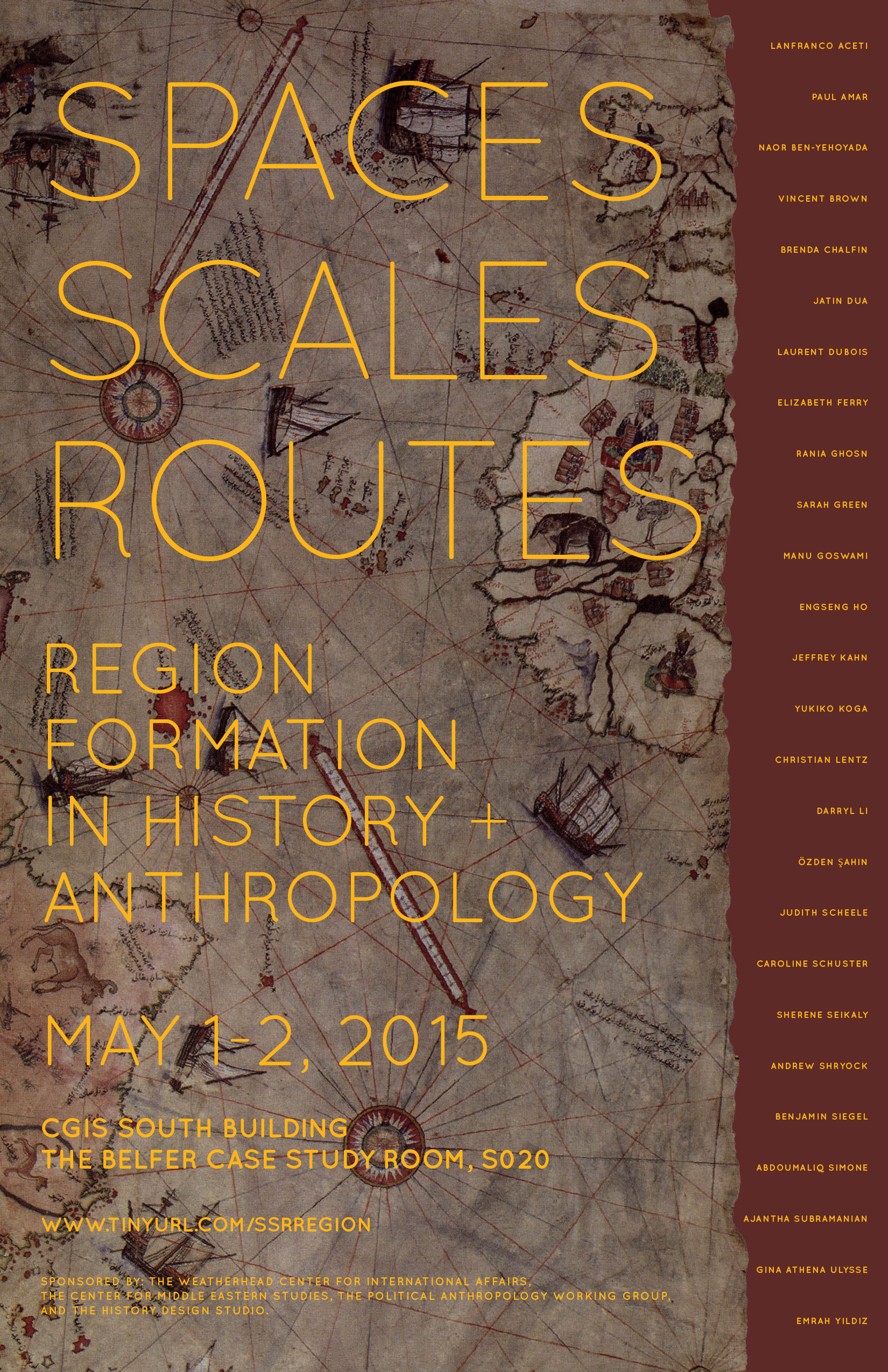In recent years, various regions have drawn growing interest in scholarly and popular debates. Clandestine migration overflows national borders along routes that often follow historical connections. Regionalist projects draw on pre-national pasts as they attempt to create supra-national political and economic formations. Infrastructural projects like pipelines, offshore mineral exploitation, highways, and telecommunication cables bind places and articulate stakes in ways that both re-imagine the past and reconfigure the future on a vast scale. Yet, most academic analysis of these trends oscillate between local, national, and global scales of analysis. This conference seeks to examine the spaces, scales and routes of such dynamics by promoting a comparative approach to region formation.
What distinguishes the current regionalism from the earlier area studies? What has given the idea of the region new traction, what is it contrasted with, what kinds of projects does it underwrite, and through what processes is a regional space materialized? This interdisciplinary conference will address these questions by examining the region, not as a pre-given scale of social life, but as a product of both “expert” classification and of social practice. We will inquire what analytical purchase the idea of the region has had, what scholars are responding to by elevating the region analytically, and what spatial practices they showcase as constitutive of region formation.

Preliminary Program
Friday May 1, 2015
9:00-11:00 Session 1: Representing Regions
Chair: Yael Berda, Harvard Academy Scholar, Harvard University
“Crossing the Line: Rituals and Realities of Life and Death in the Contemporary Mediterranean” | Lanfranco Aceti, Associate Professor of Contemporary Art and Digital Culture, Sabanci University & Özden Şahin, PhD Candidate in Media and Communications, Goldsmiths College—University of London
“Maritime Governance as Transnational Assemblage: Mapping States and Surveilling Seas in the Western Gulf of Guinea” | Brenda Chalfin, Professor of Anthropology, University of Florida
“The Friction of Geography across the Trans-Arabian Pipeline” | Rania Ghosn, Assistant Professor of Architecture and Planning, MIT
“Contemplating Distances” | Gina Athena Ulysse, Associate Professor of Anthropology, Wesleyan University
Discussant: Vincent Brown, Charles Warren Professor of History and of African and African American Studies, Harvard University
11:00-11:20 Coffee Break
11:20-13:20 Session II: Mobility and Immobility in Region Formation
Chair: Caroline Schuster, Assistant Professor of Anthropology, Australian National University
“Magical Mobilities in the Shadow of Sovereignty: The Secret Geographies of the Haitian Caribbean” | Jeffrey Kahn, Harvard Academy Scholar, Harvard University
“The Relative Location of Knots: an exploration of the entanglement of spaces, scales and routes” | Sarah Green , Professor of Anthropology, University of Helsinki
“Partisans and Partitions: War and Mobility at the Ends of Empire” | Darryl Li, Associate Research Scholar in Law & Robina Visiting Human Rights Fellow, Yale Law School
“Golden Shoes, Tobacco Seats: Sanctions and Transactions across the Iran-Turkey Border” | Emrah Yildiz, Joint PhD Candidate in Anthropology and Middle Eastern Studies, Harvard University
Discussant: Engseng Ho, Professor of Anthropology and History, Duke University
13:20-15:00 Lunch (for participants only)
15:00-17:00 Session III: Scaling States in Region Formation
Chair: Jeffrey Kahn, Harvard Academy Scholar, Harvard University
“The Mediterranean from Image to Drama: Recipe for an Historical Anthropology of Region Formation” | Naor Ben-Yehoyada, Harvard Academy Scholar, Harvard University
“Encounters at Sea: The Borders of Piracy in the Western Indian Ocean” | Jatin Dua, Assistant Professor of Anthropology, University of Michigan
“The Unmaking of Empire: Transnational Legal Space in East Asia” | Yukiko Koga, Assistant Professor of Anthropology, CUNY-Hunter College & Harvard Academy Scholar, Harvard University
“In search of the shadow fleet: Paraguay’s mau cars and the politics of bottlenecks across the triple-frontier” | Caroline Schuster, Assistant Professor of Anthropology, Australian National University
Discussant: Andrew Shryock , Arthur F. Thurnau Professor of Anthropology, University of Michigan
18:30 Dinner: Location TBA (for participants only)
Saturday May 2, 2015
9:30-11:30 Session IV: Value and Circulation in Region Formation
Chair: Yukiko Koga, Assistant Professor of Anthropology, CUNY-Hunter College & Harvard Academy Scholar, Harvard University
“’Hoovering up the Real Stuff:’ How perceptions of demand for physical gold shape some U.S. and European ideas of Asia | Elizabeth Ferry, Professor of Anthropology, Brandeis University
“Circulation and containment: region formation in the Sahara” | Judith Scheele, Post-doctoral Research Fellow, All Souls College-University of Oxford
“Translating Insurance: Capital and Economic Thought” | Sherene Seikaly, Assistant Professor of History, University of California—Santa Barbara
“Swadeshi Spaces / Sovereign Spaces: Scale and Time in the Indian Economic Imaginary” | Benjamin Siegel, Assistant Professor of History, Boston University
Discussant: Ajantha Subramanian, Professor of Anthropology and of South Asian Studies, Harvard University
11:30-11:50 Coffee Break
11:50-13:50 Session V: Temporality and Spatiality in Political Imagination
Chair: Darryl Li, Associate Research Scholar in Law & Robina Visiting Human Rights Fellow, Yale Law School
“Love Curriculum, Passion Infrastructure in Sissi’s Egypt: Re-Mapping the Moral and Material Circuits of Governance in a Neo-authoritarian Age” | Paul Amar, Associate Professor of Global and International Studies, University of California—Santa Barbara
“Crisis Economics”: Keynes and the End of Empire | Manu Goswami, Associate Professor of History, New York University
“The Uninhabitable? : An essay on regions” | AbdouMaliq Simone, Visiting Professor of Sociology, Goldsmiths College—University of London
“Vast Area, Sparse People: The Black River Region in Indochina and Vietnam”| Christian Lentz, Assistant Professor of Geography, University of North Carolina—Chapel Hill
Discussant: Laurent Dubois, Marcello Lotti Professor of Romance Studies and History, Duke University
13:50-15:30 Lunch (for participants only)
15:30-17:30 Discussants’ Roundtable: Concluding Remarks
Vincent Brown, Charles Warren Professor of History and of African and African American Studies, Harvard University
Laurent Dubois, Marcello Lotti Professor of Romance Studies and History, Duke University
Engseng Ho, Professor of Anthropology and History, Duke University
Andrew Shyrock, Arthur F. Thurnau Professor of Anthropology, University of Michigan
Ajantha Subramanian, Professor of Anthropology and of South Asian Studies, Harvard University
Moderators: Naor Ben-Yehoyada, Harvard Academy Scholar, Harvard University
& Emrah Yildiz, Joint PhD Candidate in Anthropology and Middle Eastern Studies, Harvard University
18:00 Dinner: Location TBA (for participants only)